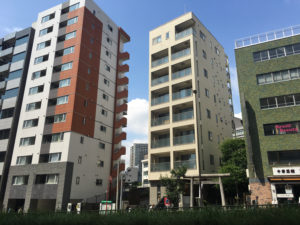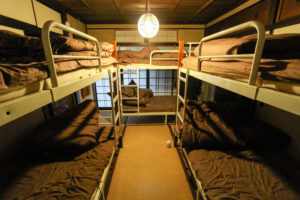The new law will be effective from June 2018 to crack down on illegal lodging
Local governments across Japan have just begun accepting applications for operating private lodging (aka ‘minpaku’ in Japanese) rental businesses under a new law going into effect in June 2018.
The law is responding to a sharp growing need for affordable accommodation amid a rapid rise in foreign tourists, while cracking down on illegal lodging.
The law is to limit the number of days per year that rooms in private homes and apartments can be rented to maximum 180.
Operators will have first obtain the certificate from the local governments and then display signs indicating the presence of rental units and manage noise and other complaints from neighbors. No-compliant operators can expect to be fined.
In the meantime, Japan’s condominium management company association recently released the nationwide survey results on the use for private lodging in condominiums in Japan.
It is the interesting development and I quickly share the summary of the report today.
In Japanese condominium buildings, it is very common that owners of each unit put together their own management association and manage the daily tasks such as cleaning and maintenance.
It is also very common the association to contract out the daily tasks by hiring the property management company.
80% of condos ban the private lodging
It says 80.5% of the condominiums associations (who usually represent the owners of the condominiums) nationwide are banning the use for the private lodging (Airbnb).
Only 0.3% of the associations accept the use for private lodging.
And 20% of condominiums have not officially decided the rules on the private lodging yet.
Those who are banning the private lodging are concerned that the value of condominiums may decline if trouble occurs due to noise and violence.
The association surveyed 365 fellow management companies who actually
manage the condominiums under the contract with the association of each condominium building.
87,372 (90% of total) out of 90,953 condominium associations responded.
The new law will come into force on 15th June, 2018 and minpaku (private lodging) without the prior approval by the local government will be banned nationwide.
Many newly built condos will ban the private lodging from the beginning
Real estate developers are also tightening the rules.
For example, Mitsubishi real estate began selling condominiums in November 2016 with a management rules which all residents in the building must follow prohibiting the use for private lodging.
Sumitomo Real Estate, Nomura Real Estate, Tokyu established a management agreement rules that effectively prohibits the use of condominiums for private lodging by limiting the use of condominium only for the residential purpose.
On the other hand, there are cases to prepare the property corresponding to the new law. In Ota Ward, Tokyo where the national strategy special zone was awarded previously, Sumitomo real estate constructed the first project for minpaku only facility. The facility was certified as the official vacation rental property.
The report by Japan condominium management company association (in Japanese only)
Vacation rental market in Kyoto
(Insights)
Average Japanese residents in condominiums (sold for residential purpose) are very much concerned about the risk of private lodgings in their property.
It will take a quite long time for people to realize that banning the private lodging completely
is not necessarily good for Japan’s economy in the macro view.
It is necessary to eliminate such anxiety and concerns in order for people to stay calm about
the private lodging.
The central government is sending the very mixed signals by promoting the inbound tourism in general but limiting the growth opportunities in private lodging market by introducing the new law and it is a typical half-measure to address the issue.
The condos for residential purpose are really closely watching the development of the new legislation but there are thousands of residential buildings sold for investment purpose as well.
(buy to let purpose)
Those owners (landlords) will actively continue to pursue the opportunities in private lodging regardless of the new legislation because often the owners don’t reside in the condos and
frankly their interest in making money often surpass risks.
So the private lodging market is not completely dead.
In the long run, if the troubles between residents and guests increase due to the expansion of the use of vacation rental, the issue will raise the more social attention and people may be polarized.
Recruit, the nation’s largest provider of temporary staff, already said that it will be collaborating with Airbnb to offer rental properties listed on its housing site, Suumo, for short-term accommodation.It is also speculated that those properties are cleverly organized by Recruit by exploiting the loophole in regulations and many of them may even operate as licensed hotels who are not regulated by the new law. (New law is only applicable to the private lodgings without hotel license)
Let’s see how it will develop.

Toshihiko Yamamoto
Real estate investing consultant and author.
Toshihiko is currently writing a book about the real estate investing in Japan
for foreign investors. About the book
Founder of Yamamoto Property Advisory in Tokyo.
International property Investment consultant and licensed
real estate broker (Japan).
He serves the foreign companies and individuals to buy and sell
the real estates in Japan as well as own homes.
He holds a Bachelor’s degree in Economics from
Osaka Prefecture University in Japan
and MBA from Bond University in Australia

